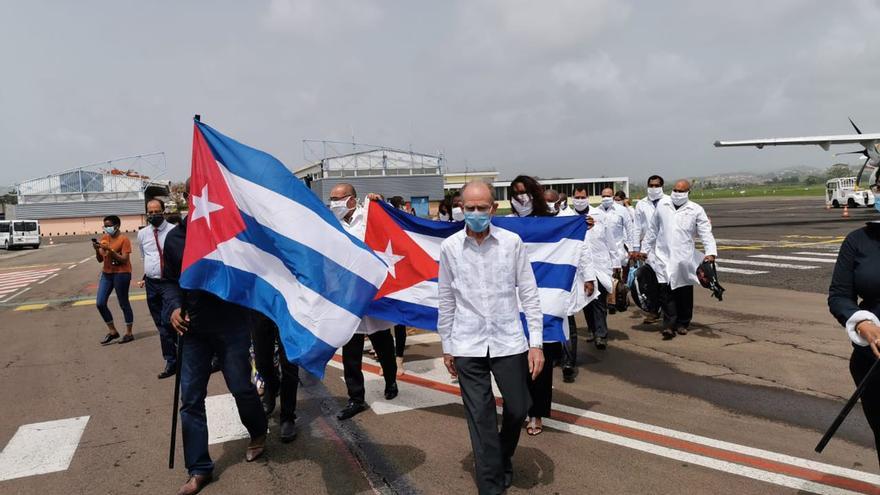
![]() Europa Press/14ymedio, Madrid, 23 July 2020 — Last Thursday, Human Rights Watch issued a reminder that “countries receiving Cuban doctors have a duty to protect the human rights of all people within their territories, including those of Cuban health workers”. For that reason, they “must ensure that any agreements reached with the Cuban government include effective guarantees for the rights of workers”.
Europa Press/14ymedio, Madrid, 23 July 2020 — Last Thursday, Human Rights Watch issued a reminder that “countries receiving Cuban doctors have a duty to protect the human rights of all people within their territories, including those of Cuban health workers”. For that reason, they “must ensure that any agreements reached with the Cuban government include effective guarantees for the rights of workers”.
In personal communication, the director of HRW for the Americas, José Miguel Vivanco, stated that “governments interested in receiving the help of Cuban doctors must insist that the Cuban government reforms its Orwellian system, which dictates with whom the doctors are allowed to live, speak with, or even establish an amorous relationship”.
The head of the NGO has warned that should this not occur, “governments that accept Cuban assistance that comes with absusive labor conditions imposed by La Habana, could be considered accomplices to serious human rights violations”.
“No one is surprised that the Cuban regime is not willing to respect the rights of its health workers, but other governments should refuse to contribute to this exploitation,” Vivanco demanded.
The organization has condemned the “draconian measures” imposed by the Cuban government on its health workers, which includes those health professionals who have travelled to other countries to assist in the fight against the Coronavirus pandemic.
The first special envoy of Cuban doctors was sent to Algeria in 1963; since then, they have spread across the world. At present, there are an estimated 30,000 Cuban doctors stationed abroad, to which a further 1,500 have been added in various countries in Europe, Africa and South America during the fight against COVID-19, according to the figures published by HRW.
“The Cuban doctors sent in response to the pandemic offer vital assistance to numerous communities, but at the cost of their most basic freedoms”, Vivanco went on to criticise.
The NGO insists that “Cuba has designed repressive laws that dictate the lives of those they send abroad”, laws which “severely limit freedom of expression, association and movement, as well as the privacy of health workers”.
Enacted in 2010 by the Ministry of Foreign Trade and Investment, “Resolution 168” would subsequently limit the right of freedom of association by defining as an offence “the establishing of friendships or any other type of relationship” with anyone “whose behaviour does not conform to the values and principles of Cuban society”, and especially those who hold “hostile or inimical views towards the Cuban Revolution”.
Furthermore, the resolution “limits the freedom of circulation”, because it also defines as an offence “the visiting of places which negatively affect the prestige (of the doctor) in the eyes of the public” or “places that, given their nature, pose a threat to public order”. “Health workers must also obtain ’authorization’ to ’take part in public events of a political or social character’”, the NGO explained.
HRW has indicated that “the freedom of expression of Cuban health workers is also severely limited”, since “they need ’direct orders and authorization’ to ’provide commentary’ to the press regarding ’internal matters within the workplace’ or which ’undermine Cuban assistance’ in the country. Likewise, “it is considered an offence to ’disseminate or propagate opinions or rumours which are to the detriment or the collective morale or prestige of any member of the group’”.
Cuban legislation also “significantly limits the right of the doctors and other Cubans to leave the country”. To that end, “health workers that form a part of the special envoys receive so-called ’official passports’ that are only valid for the duration of the mission. Upon their return to Cuba, authorities are able to prevent them from leaving the country for up to 5 years if it deems them to be workers who “provide services that are essential to the economic, social and scientific-technical development of the country”.
“The prospective sanctions for those who commit disciplinary offences range from the withholding of salaries to expulsion from the special envoy itself and a return to Cuba”, the two most commonly employed disciplinary measures, HRW went on to remark.
However, there is also the possibility of criminal proceedings for health workers who “abandon” the envoy, an act punishable by up to 8 years in prison or exile from the island for the same amount of time. Both penalties are established in Cuba’s immigration laws for those who it determines as “undesirable”.
Human Rights Watch issued a reminder that in November of 2019, a group of special rapporteurs from the United Nations investigated the predicament of workers participating in the Cuban medical envoys. Following the “first-hand” data they received regarding working conditions, the group warned that “it could constitute forced labor”.
Translated by: Andy Barton
________________
COLLABORATE WITH OUR WORK: The 14ymedio team is committed to practicing serious journalism that reflects Cuba’s reality in all its depth. Thank you for joining us on this long journey. We invite you to continue supporting us by becoming a member of 14ymedio now. Together we can continue transforming journalism in Cuba.
